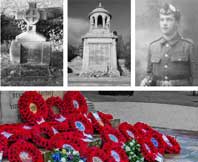This article was taken from the Helensburgh and Gareloch Times of June 1915. It describes one soldier’s story of the Second Battle of Ypres, May 1915. The letter was published anonymously by the soldier’s parents, but we think it may have been written by Corporal Neil Sharkey and the fatally wounded Sergeant Brown is Herbert Brinn Brown. Both men are remembered with honour on Helensburgh War Memorial.
A Corporal in A Company, 9th Argyll and Sutherland Highlanders, writing, France, on the 14th May, says:-
I dare say that before you receive this many stories will be in Helensburgh concerning the stern and hard work done at the beginning of this week by the 9th Argylls. For the last six weeks we have had a very busy time. Practically the whole of that time was spent in the region of the firing line between the first line of trenches and the support trenches. At the start things were very quiet with us, and the only trouble we had was the roughness and isolation of our life. However, things soon developed, and reached the culminating point at the end of last week.
At that time we were in the dug-outs in support, and on Saturday morning were called on to reinforce the brigade which held the line immediately on our left. Going through some very hot shell-fire from the Germans, we reached the trenches, where the shrapnel continued to be poured upon us. We lost about fifty that day, but kept the enemy at bay.
Being relieved at daybreak on Sunday, we had no sooner reached our dug-outs and had breakfast when the shelling started again. Our dug-outs were in a wood, and it was easily seen the Germans had the correct range; for the 'whizz-bangs', as these particular shells are called by us, came fast and furious, doing great damage to some of our dug-outs, and it was a grim task of those of us who escaped to dig out the dead and wounded. This was a task I shall never forget, for the Germans kept us company by sending in more shells.
On Sunday I think the battalion lost about forty. These deeds, however, were only a foretaste of what was to follow on Monday. Early in the forenoon, we were ordered to stand to and reinforce our own firing line. Emerging from the wood, we had to cross an open piece of ground which the Germans were shelling with great accuracy. Going across this part, my platoon commander was killed and shortly afterwards, Sergeant Brown received the wound which was to prove fatal. Sheltering in ditches, we had not long to wait for further orders. Word was sent us that the line had been broken on our left and the Germans were advancing. This was the signal for our advance, and, discarding all encumbrances and fixing our bayonets, we rushed the hill.
The smoke and dust caused by the shell-fire seemed like a thick mist on the hill, and we had to charge through this and think nothing of the shells and bullets whistling around us. We lost a good many in the advance, among them being our grand old commanding officer, Colonel Clark, who was struck by a shell whilst bandaging up a young fellow. The majority of us reached the trenches, where we were able to keep the enemy in check. On our left, however the Germans were slightly to our rear, and they opened an enfilade fire on us. With then shells in front and machine guns playing us from left we had a hot time of it, and many were lost in the trenches. However, we were prepared to hold out, but when clouds of that abominable asphyxiating gas came over we were obliged to rush to our second line of trenches.
It was at this point I was wounded, a bullet going through the muscle of my right arm. Before this, however, I had received a shrapnel bullet on the forehead. I thought it was now time for my reaching the dressing station, where my wounds were dressed, and I was sent down the line. The road to the famous cathedral town was strewn with dead and dying and all parts of equipment. It was a sickening sight. After much travelling I reached the hospital on Wednesday night, where I am enjoying the comfort of a good bed and an easy time. My wounds are healing up very quickly, and I expect to leave soon for a convalescent camp.
I consider myself very lucky in escaping as lightly, and am sorry to the many gallant lads who suffered terribly. Dumbartonshire will be in sore straits when the full story is told.

